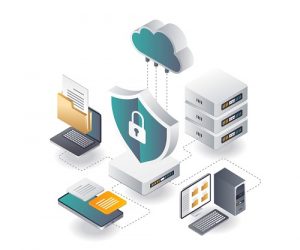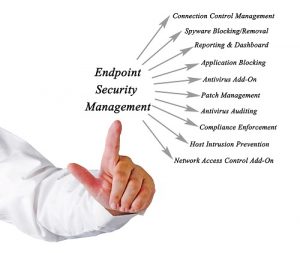 In today’s hyper-connected world, the security of business devices—desktops, laptops, smartphones, servers, and IoT systems—has become more critical than ever. These devices, often referred to as “endpoints,” are the entryways to your network and data. Without adequate protection, they pose serious vulnerabilities to cyber threats like malware, ransomware, and unauthorized access.
In today’s hyper-connected world, the security of business devices—desktops, laptops, smartphones, servers, and IoT systems—has become more critical than ever. These devices, often referred to as “endpoints,” are the entryways to your network and data. Without adequate protection, they pose serious vulnerabilities to cyber threats like malware, ransomware, and unauthorized access.
At Integrated Technology Systems, we specialize in delivering robust endpoint security solutions designed to protect your business infrastructure, reduce risk, and ensure compliance. With cybercrime costing U.S. businesses over $6.9 billion annually, effective endpoint protection is no longer optional—it’s essential.
What is Endpoint Security for Business?
Endpoint security involves safeguarding all devices connected to a corporate network from potential cyber threats. These devices—or endpoints—serve as access points to sensitive company systems and data. As the shift toward remote and hybrid work continues, securing these endpoints is now a top priority for businesses of all sizes.
Modern endpoint security solutions not only detect and prevent malware, phishing, and ransomware attacks, but also monitor real-time activity, block suspicious behavior, and stop threats from moving laterally across the network.
Why Endpoint Security Matters for Your Business
Today’s workplace thrives on mobility and flexibility. Employees connect to business networks using laptops, tablets, smartphones, and even personal devices under BYOD policies. While this enhances productivity, it also increases the attack surface for cybercriminals.
Endpoint security ensures:
- Protection against data breaches and financial losses
- Secure access to corporate resources
- Real-time monitoring and threat response
- Compliance with regulatory and privacy standards
- Trust among customers, partners, and stakeholders
Without it, your business is vulnerable to operational disruption, reputational harm, and legal consequences.
How Endpoint Security Works
An effective endpoint security system is multi-layered and continuously adaptive. Here’s how Integrated Technology Systems’ approach ensures complete protection:
 1. Device Discovery and Monitoring
1. Device Discovery and Monitoring
All endpoints—desktops, mobile devices, and IoT systems—are identified, registered, and continuously monitored for suspicious activity.
2. Security Policy Enforcement
Customized security policies based on user roles or organizational requirements ensure devices operate under controlled parameters, with regular OS updates, password protocols, and software licensing compliance.
3. Threat Detection and Prevention
Advanced technologies like behavioral analysis, AI, and signature-based detection identify and block malware, phishing attempts, and unusual activity in real-time.
4. Endpoint Isolation
Infected or compromised devices are immediately quarantined to prevent the spread of threats across the network.
5. Data Encryption and Access Control
All sensitive data on endpoints is encrypted, and access is strictly controlled based on user identity and authorization level, reducing risks in case of theft or compromise.
6. Patch Management
Automated updates and security patches close known vulnerabilities, ensuring endpoints are protected from the latest cyber exploits.
7. Incident Response and Reporting
Comprehensive logging and reporting provide insights into security incidents, including how breaches occurred and how they were contained, supporting future prevention efforts.
8. Continuous Learning and Adaptation
Our systems evolve with emerging threats, leveraging threat intelligence and past data to refine defenses and stay ahead of cybercriminals.
Key Threats to Business Endpoints
Understanding the risks can help you better prepare your defense. The top threats facing endpoints include:
Malware and Ransomware
These malicious programs are designed to infiltrate, encrypt, or damage systems. Ransomware can halt business operations and demand costly payouts, while malware often steals sensitive data or creates backdoors for ongoing attacks.
Phishing Attacks
Sophisticated social engineering tricks employees into revealing login credentials or clicking on infected links. Once inside, attackers can steal data, spread malware, or take control of systems.
Unpatched Software Vulnerabilities
Outdated software is one of the most common entry points for cyberattacks. Hackers exploit known vulnerabilities when patches are not applied in time, making timely updates a critical component of endpoint defense.
Safeguard Your Business with Integrated Technology Systems
At Integrated Technology Systems, we understand that strong endpoint security is essential for maintaining business continuity and trust. Our tailored solutions ensure that every device on your network is fortified, monitored, and compliant with the highest cybersecurity standards.
Let us help you secure your endpoints—so you can focus on growing your business with confidence.
Ready to take your endpoint security to the next level? Contact Integrated Technology Systems today to schedule a security consultation or request a customized protection plan for your business.
Continue reading on endpoint security in our next post - a complete guide to setting up endpoint security.
Integrated Technology Systems
6 East 45th Street, Suite 400
New York, NY 10017
212-750-5420
https://www.itsnyc.com



